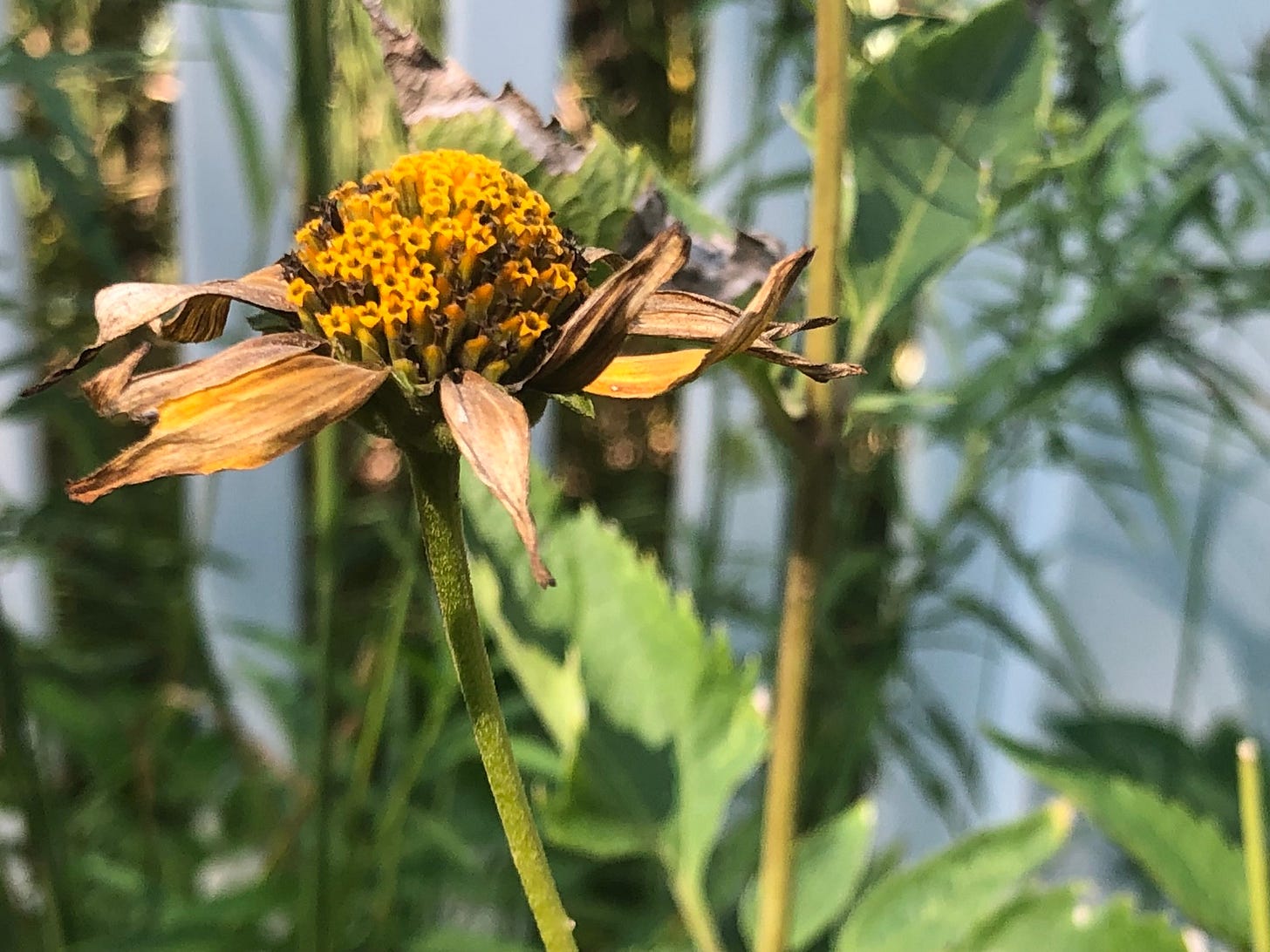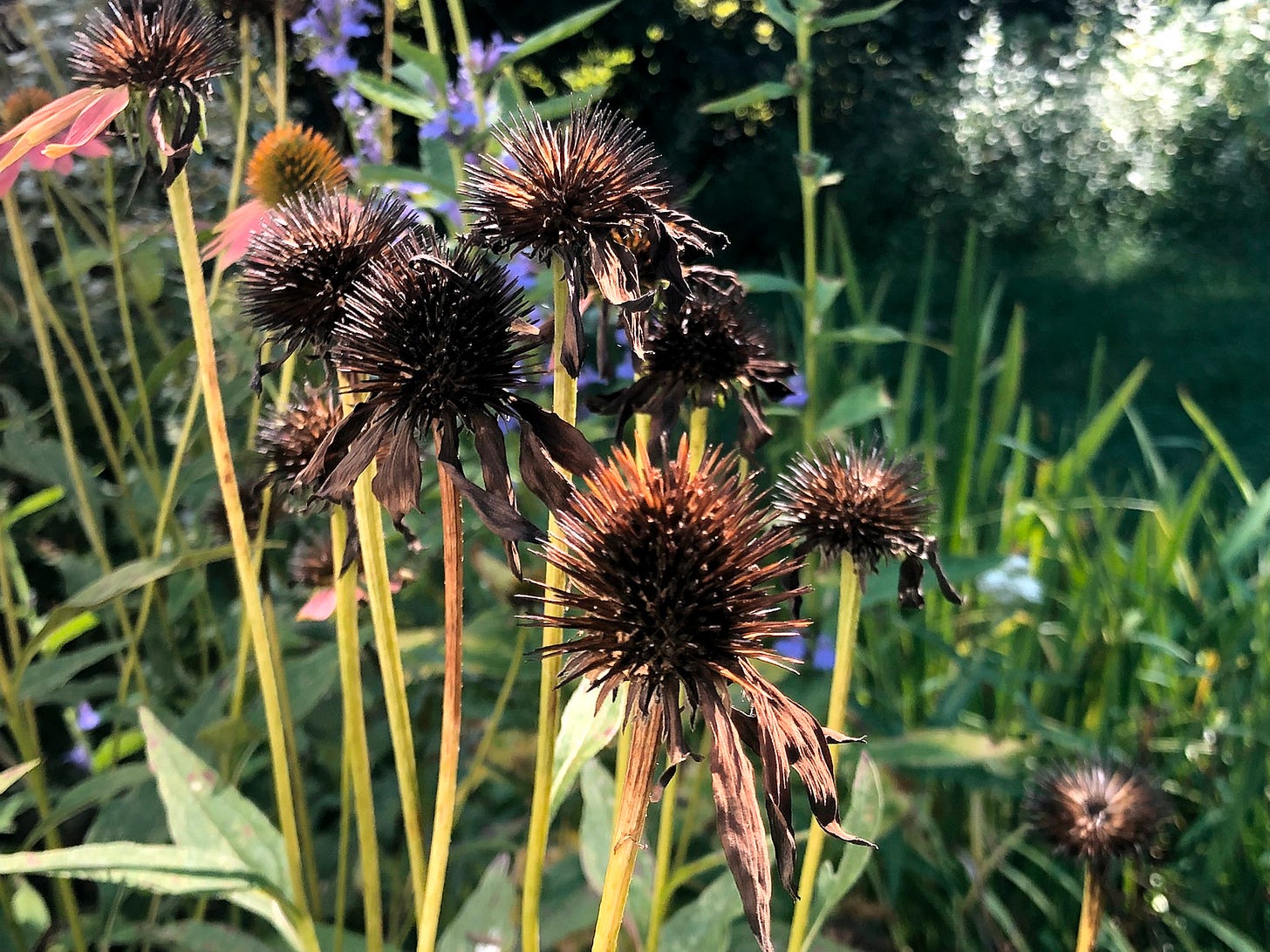The Song of September is a Lament
bitter before sweet
If you liked reading this, feel free to click the ❤️ button on this post so more people can discover it on Substack 🙏
The most profound myth we have from the classical world is the story of Persephone, Demeter, and Hecate.
I’ve always believed it was the most important myth for women, but over the years, its universal underpinnings and relevance for men and women have been revealed to me.
This myth is more significant than just one layer or interpretation. Like all symbols, it’s multivalent and has many interpretations, applications, and correspondences.
At its most basic level, this myth is about birth and death, the ultimate universal. We are all born, and we all die. The grave is the great equalizer; kings and paupers alike meet the same end.
Between those two, we all come of age, suffer loss and grief, and wrestle with discovering and being who we indeed are. If we are committed to developing our souls, we find some measure of spiritual wisdom and knowledge that allows us to place our faith in something greater than ourselves before we die.
Those are just the scant outlines of this story.
As always, in a fractal universe acted upon by archetypal patterns and governed by cycles and seasons, we can find this complex story stamped on the natural world—the supra-natural hovering over the natural.
For those with eyes to see, and some of you have those eyes, the uber reality is visible in plain sight or at least in dreams and visions. Yet, everyone is invited to receive instruction from nature.
The fact that the myth of Persephone is often dismissed as a primitive explanation of the changing seasons misses the point. The observable changing seasons are a primary text in the esoteric knowledge you can gain when you attend the school of the seasons.
In September, we find ourselves in nature’s classroom, learning the lessons of loss, longing, and lament. The autumnal equinox signals Persephone’s return to the underworld. At this moment in the year, we must wrestle with memories of abduction, the loss of innocence, the harsh realities of life, the taking on of roles and responsibilities, and the inner integrity to keep the fires of compassion burning even as we learn to rule with wisdom over our subjects, especially when those subjects are the inner parts of ourself. All this is just Persephone’s part of the tale.
Even more moving is Demeter’s part in this story.
Just as her daughter, Persephone, is coming of age, she is abducted. What tragic or more terrifying thing can happen to a parent? During this crisis, we take up the thread of Demeter’s part in this unfolding, multilayered story that is, in so many ways, the story of us all.
The parent-child bond, particularly the mother-child bond, is arguably the most fundamental and influential of all relationships. When it is violently ruptured, what anguish can compare to that?
Similarly, our coming-of-age experience, which necessitates disentangling and cord-cutting from our mothers, fills us with anguish as we learn to become our own archetypal Mother and discover a divine Mother, even as we continue to love and honor our natural mother.
We are in the last weeks of ripening grain. Lammas is nearly complete, and the season of Autumn Equinox is just ahead. In the cosmos above, it is Virgo season, and all eyes are now fixed on The Maiden and her underworld journey. When the equinox arrives, the scales will balance, and we will step into Libra season. There will be a reckoning, a recalibration, a realignment of energies, forces, and entities moving about and playing their part in nature. Since we are also a part of nature, this will also affect us.
Demeter’s Lament
Demeter suffers the abduction of her daughter, which can also be understood as the loss of her innocence, maidenhood, youth, and authentic, carefree child self. She reels from the betrayal of Persephone’s father, Zeus, who allows his brother Hades to abduct her. A lesser-known part of this myth is that for years, Demeter hid Persephone away on an island in a cave with monstrous guardians protecting her because she had so many men pursuing her.
As you can see, there’s plenty here to unravel from a mythic, psychological, and spiritual viewpoint.
However, the lament, the sorrowful, bittersweet quality of the season, feels universal and relevant.
These first few weeks of September are the last moments of summer. They are golden, halcyon, satisfying, and achingly beautiful, filled with fragrant flowers, fruit, and the peaceful atmosphere of a plentiful grain harvest. All is well.
Yet, we sense the change, like an uneasy sensation crawling along our skin and the disquieting intrusion of a dark suspicion. The equinox will come, and the light will begin to go out. It will take some weeks, but winter and darkness will come.
Nature begins her lament, and so do we. Even as we celebrate the harvest and count our blessings, the haunting refrain of a lament wails in the background of our minds.
All around us, nature begins her bitter lament. Meadows and marshes once filled with the blue metallic glint of tree swallows swooping and diving now see them congregating, readying themselves to leave the rushes and reeds they love. Hummingbirds also are preparing to abandon their summer abodes. The spring songs of frogs have long gone quiet, and only the crickets serenade the night. The night itself lost its balmy breeze in September, and it caresses shoulders and cheeks with an unexpected chill. Summer friends and summer weather are leaving.
Once round and voluptuous, hydrangeas fade to tattered brown, papery, and thin. Roses, once the sensual queen of the June garden with soft petals and fragrant perfume, now show aged blooms shriveling to brown as they drop to the ground, leaving only thorns and hips slowly ripening.
Most flowers are long past their prime; if they still have blossoms, they are faded and moldy. Their seed heads are skeletal and pecked at by birds.
It is all passing away, even as the harvest is brought home. Summer’s beauty is no more. This is Persephone in her most genuine and oldest essence, a vegetation goddess. She is cut down by a scythe or released naturally as her life cycle ends. Either way, she returns to the underworld of the earth.
In the recurring Persephone, Demeter Hecate cycle summer’s end is the beginning of Demeter’s lament as she must part from her beloved daughter as she returns to the underworld. Grief, loss, lament, again and again, year upon year.
September holds partings, endings, regrets, and losses. In the initial sections of the story, Demeter wanders the earth mournfully, calling out for Persephone and searching everywhere, exhausted and uncertain about her fate. As the story progresses, Demeter finds her inner power with the help of Hecate (her wise older Self) secures Persephone’s return. But it is an imperfect return; Persephone may only reunite with her mother in spring and summer, and then she must return to the underworld for autumn and winter. This is part of the lament. Things can never go back to the way they were. That time is gone. While some things may be recovered, a new way forward must be created. The past is now the past, and we live with its effects now and into the future. There will always be winter when we feel the full impact of loss and take up our lament again.
The resolution of this myth is the hidden miracle within the seed. After it is consigned to the earth, it breaks forth in spring, and times of joy, peace, wholeness, and beauty return. The bitter comes before the sweet. Bitter is medicinal, a purgative, a remedy that removes what ails the body and soul in preparation for healing and health to return.
The lamenting energy of September is real. If you sense it, don’t retreat from it. Use it to your benefit. This myth has many aspects, and we have only scratched the surface. Use these weeks before the balancing energies of the autumnal equinox arrive to explore the full force of lament moving through you.
We lose people, relationships, youth, beauty, health, possessions, and sometimes wellness and peace of mind. We suffer betrayals of circumstance and betrayal by some we thought were friends and allies. We wander until exhaustion nearly defeats us. We lament these in September when the earth laments another season gone; another year passes into memory, changes have come, and beauty has faded.
Synchronizing your lament with the Earth’s lament is powerful and profound. This is the season for it. Nature is waiting to embrace your song of lament and harmonize it with her own. Wrapping up your wailing with the shrieking of the winds and the rush of pouring rain, letting the sorrowful notes fall on the waiting ground joins them to something more, something greater, something healing.
Lament can be a response to deep hurts and great tragedies. It can also respond to missed opportunities, roads not taken, or unexplored paths. It makes space for remembering time lost and years eaten up by illness or hardship.
To lament is not to complain, blame, or despair. Lament is the age-old practice of feeling deeply, letting it run through you, and finally releasing the wounds or regrets you carry. Lament honors complex emotions and feelings and acknowledges what has happened or what was lost. Lament can also remember the beauty and goodness, so the memory of those times stays strong and clear in the mind and heart.
Lament is healing and a healthy practice. We must have ways to say goodbye, let things go, and accept how our lives change over time.
If any of this resonates with you, I encourage you to explore the season of lament and create your own ritual and practice of lament. Writing and song are very traditional ways of lamenting, but embodied practices like dance lend themselves to the practice of lament.
Inner healing work is often best accomplished in alignment with the energies of the seasonal flow of the earth.
Is lament a new concept to you? Does lament seem like something that you need but never knew existed? Is entering into lament through writing or song something you might try?
Remember you can access all past essays using
The Archive (latest entry first}
or by using the
Topics Library (by theme)
The comments section is a safe and welcoming space to share your insights and experiences.
Comments and conversation are always appreciated and enjoyed, so feel free to let your voice be heard. I read them all and try to respond to each one.
Thank you for reading Hedge Mystic and participating in this vibrant and growing community of creative, spiritual humans. You are always welcome here, appreciated, and loved.








So beautiful and supportive, Jan, thank you for this! And I LOVE your collage of Persephone reflecting on her life. ❤️
It is a very welcome change to read about the lament. Accepting the lament is full of strength, honesty and acceptance. Thank you for writing about it!